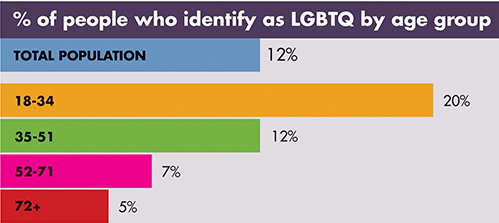BY BTL STAFF

GLAAD unveiled its third annual Accelerating Acceptance report March 30, a survey conducted on GLAAD's behalf by Harris Poll, which shows that young people are significantly more likely to openly identify as LGBTQ than generations before them. The survey – fielded online November 2-4, 2016 among 2,037 U.S. adults ages 18 and older – also shows growing levels of young people who are more likely to identify outside of traditional binaries such as "gay/straight" and "man/woman."
"As the administration begins to fulfill its pledges to move the country backwards, many are concerned about progress made in recent years for the LGBTQ community," said Sarah Kate Ellis, GLAAD President & CEO. "However, this report shows a remarkable new era of understanding and acceptance among young people – an inspiring indication of the future. Though laws can be unwritten, hearts and minds in America have been changed for the better – and that is a reality less easily unraveled."
Key Findings
The survey shows that Millennials (people ages 18-34) are significantly more likely to openly identify as LGBTQ than generations before them. Specifically, Millennials are more than twice as likely (20 percent vs. 7 percent) to identify as LGBTQ than the Boomer generation (people ages 52-71) and two-thirds (20 percent vs. 12 percent) more likely than Generation X (people ages 35-51).
The survey also found that 12 percent of Millennials identify as transgender or gender non-conforming, meaning they do not identify with the sex they were assigned at birth or their gender expression is different from conventional expectations of masculinity and femininity — doubling the number of transgender and gender non-conforming people reported by Generation X (6 percent).
While older generations (people ages 35+) of LGBTQ people largely use the words "gay" and "lesbian" and/or "man" and "woman" to describe their sexual orientation and gender identity respectively, Millennials appear more likely to identify in terminology that falls outside those previously traditional binaries.
Interestingly, non-LGBTQ Millennials are also significantly less likely to know someone who identifies as "gay" or "lesbian" than generations before them, indicating that their LGBTQ peers largely describe themselves in words outside more traditional binaries.
The survey shows that while acceptance of LGBTQ people remains high, progress has slowed since the landmark Supreme Court ruling, with rates of discomfort declining on average by 3 percent from 2014-2015 but going unchanged from 2015-2016.
This new data builds on GLAAD's first two Accelerating Acceptance reports, which revealed significant levels of discomfort among non-LGBTQ people with their LGBTQ coworkers and neighbors. The report is available here.










